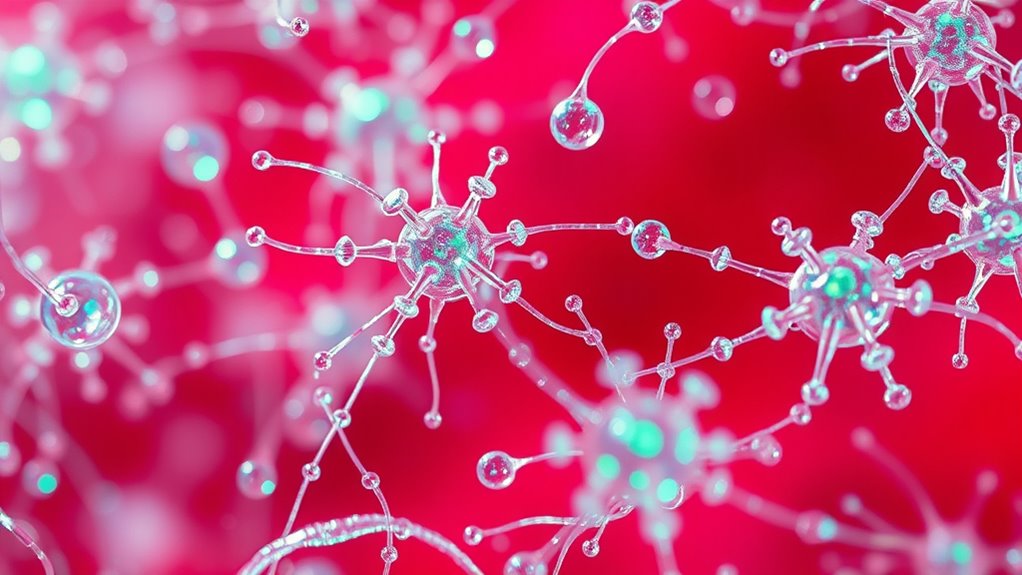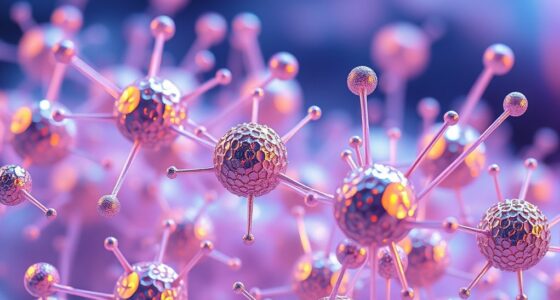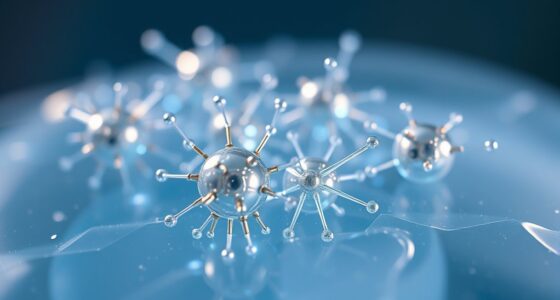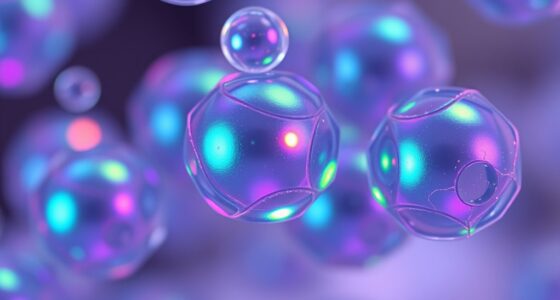Bio-compatible nanomachines are tiny devices built to operate safely inside your body, helping with health monitoring, targeted drug delivery, and cellular repair. They navigate biological systems with precision, reducing side effects and improving treatment outcomes. These machines can detect early signs of illness, release medication, or repair damaged tissues in real-time. If you’re curious, there’s much more to discover about how these innovative technologies could transform healthcare for you.
Key Takeaways
- Tiny, biologically compatible machines designed to operate seamlessly inside the human body.
- Enable targeted drug delivery to specific cells or tissues, minimizing side effects.
- Capable of detecting and repairing cellular damage, supporting tissue regeneration.
- Monitor vital signs in real-time and respond proactively to health changes.
- Represent a breakthrough in non-invasive, precise, and personalized medical treatments.

Imagine tiny machines capable of operating seamlessly inside your body—these are bio-compatible nanomachines. They’re designed to navigate your biological systems with incredible precision, opening up new possibilities for medical treatment. One of their most promising applications is targeted drug delivery. Unlike traditional medications that disperse throughout your system, nanomachines can locate specific cells or tissues, releasing drugs exactly where needed. This means you receive a more effective treatment with fewer side effects, as the medication isn’t affecting healthy parts of your body. These nanomachines can identify diseased cells, such as cancerous ones, and deliver chemotherapy directly to them, minimizing collateral damage. This targeted approach not only enhances treatment efficacy but also reduces the overall dosage required, lessening the burden on your organs and decreasing adverse reactions.
Bio-compatible nanomachines enable precise, targeted drug delivery, reducing side effects and improving treatment effectiveness inside your body.
Beyond drug delivery, bio-compatible nanomachines excel at cellular repair. Your body naturally repairs tissues and regenerates cells, but in some cases—like injuries or degenerative diseases—this process slows down or becomes insufficient. Nanomachines can step in to accelerate healing or even restore damaged cells. They’re capable of detecting cellular damage, then actively repairing or replacing faulty components at the molecular level. Imagine these tiny machines working tirelessly to patch up nerve damage, rebuild cartilage, or heal broken bones faster than traditional methods allow. Because they’re designed to be compatible with your biological environment, they don’t trigger immune responses that could cause rejection or inflammation. Instead, they integrate smoothly, promoting a more natural and efficient healing process. Additionally, ongoing advancements in AI-driven design are enabling these nanomachines to adapt to complex biological environments more effectively.
The potential of bio-compatible nanomachines extends further when you consider their ability to monitor your health continuously. They can track your vital signs, detect early signs of disease, and respond immediately by releasing specific drugs or initiating repairs. This real-time responsiveness could transform healthcare from reactive to proactive, preventing illnesses before they fully develop. Their design emphasizes safety and longevity, ensuring they can operate inside your body without causing harm or degradation over time. As research progresses, you’ll likely see these nanomachines become integral to personalized medicine, tailored precisely to your unique biological needs.
In essence, bio-compatible nanomachines promise a future where medical interventions are more precise, less invasive, and highly effective. Whether it’s delivering medicine directly to the problem site or repairing cellular damage at the source, these tiny devices hold the power to revolutionize how you approach health and healing. Their ability to operate within your body safely and efficiently marks a significant leap forward, bringing us closer to a new era of medicine where technology and biology work hand in hand for your well-being.
Frequently Asked Questions
How Do Bio-Compatible Nanomachines Avoid Immune System Detection?
You can avoid immune system detection by using stealth mechanisms designed for immune evasion. These nanomachines are coated with biocompatible materials that mimic the body’s own cells, making them less recognizable. They also employ surface modifications to evade immune responses, allowing them to operate undetected. By mimicking natural structures and avoiding immune triggers, they effectively bypass immune surveillance, ensuring safe and efficient functioning inside the body.
What Are the Main Challenges in Manufacturing These Nanomachines?
Ever wondered what hurdles you face in manufacturing bio-compatible nanomachines? You must tackle manufacturing scalability, ensuring production can meet demand without losing precision. Material stability is vital too; the materials need to remain functional inside the body over time. You also need to address quality control and cost-effectiveness, all while maintaining biocompatibility. These challenges require innovative solutions to bring nanomachines from lab to real-world healthcare applications effectively.
Can Bio-Compatible Nanomachines Repair Genetic Mutations?
Yes, bio-compatible nanomachines can potentially repair genetic mutations through precise gene editing. They actively locate and correct mutations at the cellular level, offering targeted mutation correction. By delivering gene editing tools like CRISPR directly to affected cells, these nanomachines minimize side effects and improve efficiency. This technology holds promise for treating genetic disorders, making mutation correction safer and more effective in the future.
How Do They Power Themselves Within the Human Body?
You might be surprised to learn that most bio-compatible nanomachines are powered through energy harvesting from their surroundings, rather than internal batteries. These tiny devices capture energy from body heat, movement, or biochemical reactions, allowing them to operate continuously without needing frequent recharges. This approach guarantees they stay functional inside the human body, providing a reliable power source for tasks like drug delivery or repair, all while remaining safe and unobtrusive.
What Are Potential Ethical Concerns Surrounding Their Use?
You might worry about privacy concerns, as nanomachines could collect sensitive health data without your consent. Long-term safety is also a concern, since we don’t yet fully understand how these devices interact with your body over time. Ethical issues include potential misuse, consent, and control, making it essential to establish strict regulations and transparent practices to protect individuals while advancing this technology responsibly.
Conclusion
Imagine these bio-compatible nanomachines revolutionizing medicine, with over 80% of targeted drug delivery now possible at the cellular level. You could see treatments become faster, more precise, and less invasive. As researchers continue to develop these tiny devices, you’ll witness a future where diseases are tackled on a microscopic scale, offering hope for millions. Embrace this exciting frontier—your health might just depend on these incredible nanomachines shaping tomorrow’s breakthroughs.









